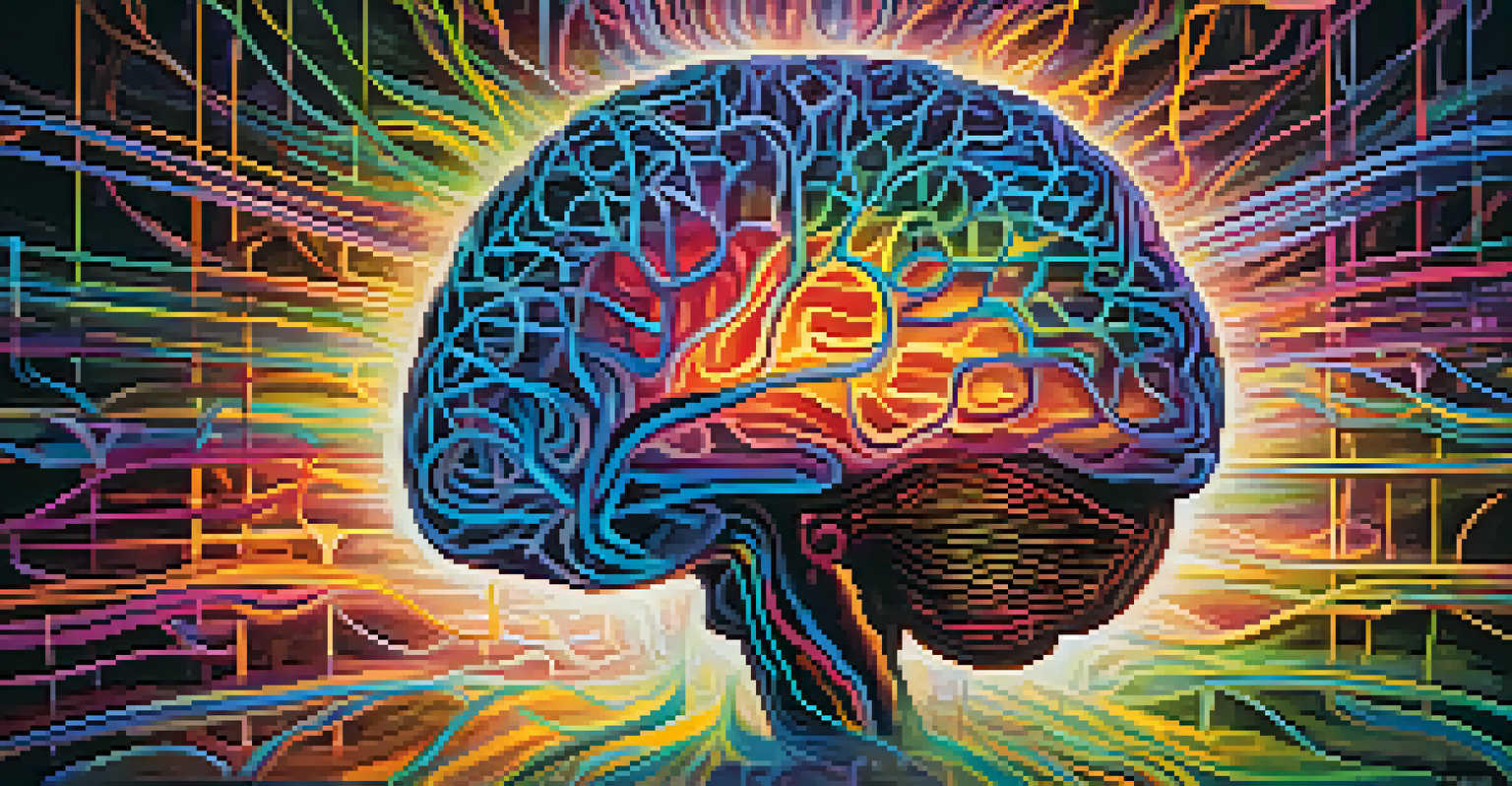Psychedelics and the Mind: Unlocking Inner Tranquility

Understanding Psychedelics: A Brief Overview
Psychedelics are substances that alter perception, mood, and cognitive processes. Common examples include psilocybin, LSD, and DMT. These compounds have been used for centuries in various cultures, often for spiritual or therapeutic purposes.
Psychedelics allow us to journey beyond the confines of our minds, opening doors to new possibilities and insights.
In recent years, there's been a resurgence of interest in psychedelics within the scientific community. Researchers are exploring their potential to treat mental health conditions such as depression, anxiety, and PTSD. This renewed attention highlights the importance of understanding how these substances interact with our minds.
By delving into the mechanisms of psychedelics, we can begin to appreciate their ability to unlock new perspectives and insights. This journey into the mind can lead to profound experiences, offering a glimpse into our inner selves and the tranquility that lies within.
The Science Behind Psychedelics and the Brain
Psychedelics primarily work by interacting with serotonin receptors in the brain. This interaction can lead to altered states of consciousness and shifts in perception. For example, users often report enhanced sensory experiences and a sense of interconnectedness with the universe.

Studies have shown that psychedelics can promote neuroplasticity, which is the brain's ability to reorganize itself by forming new neural connections. This can be particularly beneficial for individuals suffering from mental health disorders, as it allows for new ways of thinking and coping strategies.
Psychedelics Aid Mental Health
Research shows psychedelics like psilocybin can significantly improve conditions such as depression and PTSD.
By understanding the science behind these substances, we can appreciate their potential to facilitate profound personal growth. This is where the journey toward inner tranquility begins, as individuals explore the depths of their consciousness.
Psychedelics and Mental Health: A Growing Field
Recent clinical studies have revealed promising results in using psychedelics for mental health treatment. For instance, psilocybin therapy has shown significant improvement in patients with treatment-resistant depression. These findings are encouraging, suggesting that psychedelics could be a viable option for many seeking relief.
The greatest discovery of my generation is that a human being can alter his life by altering his attitude.
The therapeutic potential of psychedelics lies in their ability to foster emotional breakthroughs. Many users describe experiencing cathartic moments during their trips, allowing for the release of pent-up emotions and trauma. This release can pave the way for healing and a greater sense of peace.
As research continues to unfold, the stigma surrounding psychedelics is slowly diminishing. This shift is crucial in making these treatments more accessible to those in need of mental health support, ultimately leading to a greater understanding of their benefits.
Personal Experiences: Finding Peace Through Psychedelics
Many individuals have shared their transformative experiences with psychedelics, often highlighting the sense of peace they discovered within themselves. For instance, a person might recount how a guided mushroom trip helped them confront deep-seated fears, leading to a newfound sense of calm.
These personal anecdotes can serve as powerful testimonials to the potential of psychedelics. They illustrate how these substances can facilitate profound insights and emotional healing, allowing individuals to break free from anxiety and stress.
Importance of Safe Settings
The environment in which psychedelics are consumed greatly influences the experience, emphasizing the need for a safe and comfortable setting.
While everyone's journey is unique, the common thread is the quest for inner tranquility. Through these experiences, people are not only finding peace but also learning to navigate life's challenges with a fresh perspective.
Setting and Integration: Keys to a Safe Experience
The setting in which one consumes psychedelics is crucial for a positive experience. A safe, comfortable environment can help individuals feel more at ease, allowing for deeper exploration of their thoughts and feelings. This is often referred to as 'set and setting,' which plays a significant role in the overall outcome of the experience.
Integration, or the process of making sense of the psychedelic experience, is equally important. After a journey, individuals may benefit from discussing their insights with a therapist or support group. This can help to ground their experiences and apply lessons learned to everyday life.
By prioritizing both setting and integration, individuals can enhance their chances of achieving inner tranquility. This mindful approach encourages a deeper connection to oneself and fosters lasting change.
Challenges and Considerations in Psychedelic Use
Despite their potential benefits, psychedelics are not without risks. Some users may experience challenging trips, leading to anxiety or confusion. It's essential to approach these substances with caution and to be aware of one's mental health history before diving into a psychedelic experience.
Additionally, the legal status of psychedelics varies across the globe, which can complicate access to these substances for therapeutic purposes. Understanding the legal landscape is crucial for those interested in exploring psychedelics safely and responsibly.
Growing Acceptance and Research
As studies on psychedelics expand, societal stigma is decreasing, paving the way for more accessible mental health treatments.
By acknowledging these challenges, individuals can make informed decisions about using psychedelics. This awareness can lead to a more balanced view of their potential, allowing for safer exploration of the mind.
The Future of Psychedelics in Mental Health Treatment
As research into psychedelics continues to grow, the future looks promising for their role in mental health treatment. Increasing numbers of clinical trials are being conducted, focusing on various conditions and demographics. This research will help to solidify the understanding of how psychedelics can be effectively integrated into therapeutic settings.
Moreover, as more professionals advocate for the therapeutic use of psychedelics, we may see shifts in societal perceptions. This could lead to changes in legislation, making these treatments more accessible to those in need.

Ultimately, the future of psychedelics in mental health treatment hinges on continued research and education. By fostering a greater understanding of these substances, we can unlock their full potential in promoting inner tranquility and healing.